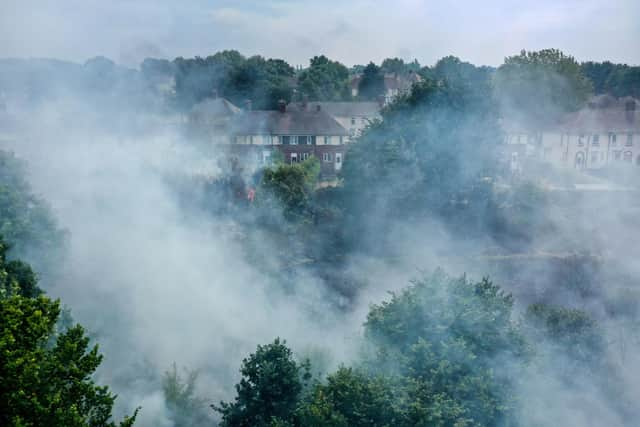Climate change: Why air pollution, a deadly threat, is getting worse as the world warms and wildfires rage – Joseph Carter
One major impact is that higher temperatures lead to increased air pollution. We’ve seen that levels of ozone pollution, in particular, have risen as a direct result of hotter weather.
In addition, smoke and soot from wildfires in the UK and across Europe have caused spikes in air pollution. As we accelerate towards climate breakdown, the quality of our air will only get worse.
Advertisement
Hide AdAdvertisement
Hide AdAir pollution is incredibly dangerous. It can cause new lung conditions and worsen existing ones and can trigger potentially life-threatening asthma attacks. In the UK, we found 70 per cent of people with asthma are worried about how climate change will affect their health, and rightly so.
Studies show that the poorest communities, where air pollution is more likely to be high, will feel the brunt of these temperature rises. People in such neighbourhoods are seven times more likely to die of a respiratory condition than those in the richest areas, meaning they face a triple threat of air pollution, climate change and health inequality.
Transport accounts for a third of the UK’s carbon emissions and 80 per cent of toxic air at the roadside, so there are huge gains to be made by tackling both climate change and air pollution together.
The biggest environmental threat to human health in the UK, air pollution contributes to around 36,000 premature deaths each year. Across the world, it has been estimated that poor air can be linked to one in five deaths, roughly eight million a year. So, any factors that increase air pollution, like climate change, are a major concern especially as here in Scotland, a fifth of people will develop a lung condition in their lifetime.


So, what are we going to do about it?
Last year, at the COP26 summit, world leaders committed to tackle climate change by reducing coal burning and deforestation, transitioning to zero-carbon vehicles, and helping developing countries adapt to climate change. During those exciting two weeks, everyone was thinking about climate change. The challenge is how we get everyone thinking about it again.
The Cleaner Air Scotland strategy was relaunched last year, with the health impacts of air pollution as a clear focus. Low-emissions zones were expanded to include cars from 31 May 2022, but we need to do more. Existing zones should be expanded with more introduced to other cities.
We need to tackle vehicle idling, particularly around schools and hospitals; help people transition to electric vehicles through a comprehensive scrappage scheme; invest in linked-up public transport; and ban the sale of inefficient wood burners and the most polluting domestic fuels.
Hotter summers, colder winters are likely to bring new threats for those with lung conditions, putting huge pressures on health services. We know in extreme weather people with lung conditions are more likely to end up in hospital.
Advertisement
Hide AdAdvertisement
Hide AdWhile we welcome the Scottish Government’s target of net-zero emissions by 2045 – one of the most ambitious in the world – much more must be done to establish effective policies to reduce air pollution, for the sake of human health as well as the planet.
Joseph Carter is head of Asthma + Lung UK Scotland
Comments
Want to join the conversation? Please or to comment on this article.
